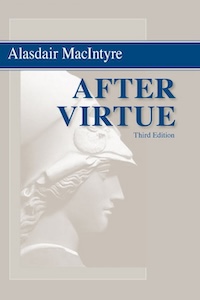After Virtue, Chapter 2 [Notes]
28 Oct 2025

After Virtue: A Study in Moral Theory, Third Edition
Alasdair MacIntyre
University of Notre Dame Press, 1981, 2007
Chapter 2 - Moral discourse today and the question of emotivism
AM gives examples of common moral arguments, then makes some observations:
1. They boil down to rival initial premises which are incommensurable (e.g. rights to personal bodily autonomy vs imperative against murder, in abortion) - and since there are no reasons for preferring one premise over another — so that we can neither convince somebody to adopt one over the other, and subsequently we fear that our own moral arguments lack rational foundation — debate takes on a shrill character.
2. They are nonetheless impersonal — which leads to a paradox: if they are personal beliefs, why use impersonal language?
3. The arguments have clear historical/cultural antecedents (e.g. Marxism, Christianity, rights theory, etc.)
All this raises the question of emotivism: are all moral judgments merely expressions of personal preference / attitude? (when I say “this is wrong” what I mean is “this—yuck!”)
Initial criticisms of emotivism as a theory of meaning:
1. Unclear what feelings/attitudes exactly are expressed (what is “approval”?)
2. Moral statements function differently from expressions of attitude (commonsense objection)
- Persuasive force of expressions of attitude is dependent on context (e.g. boss to employee) whereas moral expressions is ostensibly not
3. Emotivism is a theory about meaning. However, attitude is a function not of the meaning of a sentence, but of its use.
So: is emotivism better expressed as a theory of use rather than meaning? Which is to say, is meaning at odds with use, such that use conceals meaning, even for the speaker? (I.e., do we use impersonal moral language to express personal attitudes, even though we may not know that’s what we’re doing?) Is moral language seriously misleading/manipulative?
What follows is an analysis of the history of emotivism as a theory — main takeaway (I think) is that the development of the theory seems to have been in response to intuitionism, which began at Cambridge in 1903 and flourished shortly after. (Intuitionism was a reaction to the idea of “good” as an objectively discoverable property, which in turn was intended to replace classical natural law.) Analytic philosophy rejected emotivism b/c moral reasoning does occur. Problem is, analytic philosophy requires justification by first principles, which appear to be a matter of preference. Modern analytic philosophers attempting to discover, articulate, and/or justify first principles can’t come to agreement, or gain any ground. (see Rawls & Nozick, ch 18)
(Also of note: MacIntyre rejects the characterization of ethics, and philosophy in general, as just a single conversation w/ may different players… a characterization which leaves out the changing terms and context to that discussion)
Critical question is not only whether emotivism is true, but what would happen if everybody believed that it was?
AM posits that by and large we actually do, and in the next chapter will analyze features of our society that demonstrate that belief.